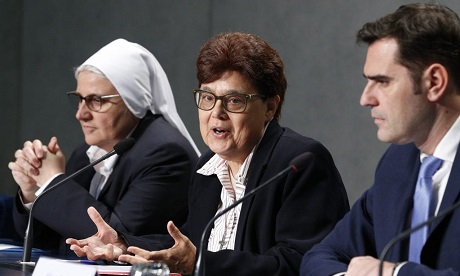Over the past six years, the profile of women at Vatican events, especially women religious, has risen sharply. Since Pope Francis’s election, more women have been taking centre stage with the “parrhesia” or boldness he encourages.
Today Members of the International Union of Superiors General (UISG) – who lead about 450,000 women religious around the world – are regularly invited to Vatican meetings at every level.
Sister Carmen Sammut, who is the UISG president, says “with the Vatican dicasteries, many things have changed” over the past six years. “We have … been knocking on doors, and doors have been slowly opening” at the Synod of Bishops and at the meetings of Vatican congregations and councils.
The UISG vice president, Sister Sally Hodgdon, agrees, saying “Since Pope Francis, things have changed radically.”
In her view, Vatican offices “are much more open, more user-friendly.
“It seems each year they listen a little more and follow through more on our ideas.”
Hodgson says Vatican officials are realising more women have some of the skills and experience they need, while the sisters are realising how they can be “prophetic in different ways”.
She cites the Way of the Cross meditations written by Sister Eugenia Bonetti for Francis’s celebration at Rome’s Colosseum.
Her prayerful, pious meditations explicitly condemned men who go to prostitutes, governments who have slammed their borders closed against migrants and refugees, and Catholics who prefer to look the other way in both situations.
Another example of women religious making waves at the Vatican came during the February summit on child protection.
At this, Sister Veronica Openibo told Francis and the world’s bishops’ conference presidents that the hypocrisy of Catholic leaders who claimed to be guardians of morality yet remained silent about clerical sexual abuse has left the Church’s credibility in shambles.
Hodgson says the changing status of women also can be seen in the pope’s interaction with participants at UISG plenary meetings. These are held every three years in Rome.
Francis addressed the first UISG plenary in 2013.
While the women were only in the audience at this meeting, this changed in 2016 when they were able to ask Francis questions.
These included questions about opportunities for women to preach; the importance of involving women in church decision-making, especially when the decisions impact women; and handling requests from bishops and priests looking for free labour from religious orders.
They also asked whether he’d be willing to set up a commission to explore the roles of the women identified as deacons and whether they were ordained or simply “blessed” in some way for service.
Within three months, Francis appointed six women and six men to a study commission to respond to these questions. In January this year two commission members said their work had been completed and a report was given to Francis.
Ongoing issues include the prospect of women voting in the Synods of Bishops, the sexual and psychological abuse women religious have suffered at the hands of priests, and UISG members’ obligation to end the abuse of child and vulnerable adults in the Church and society.
Source
